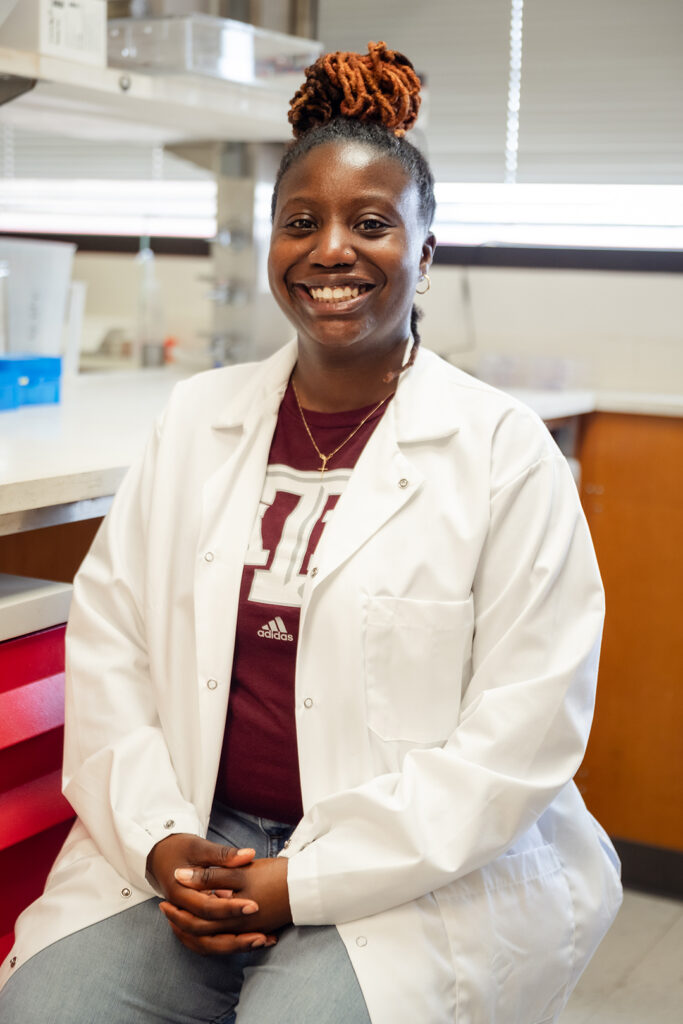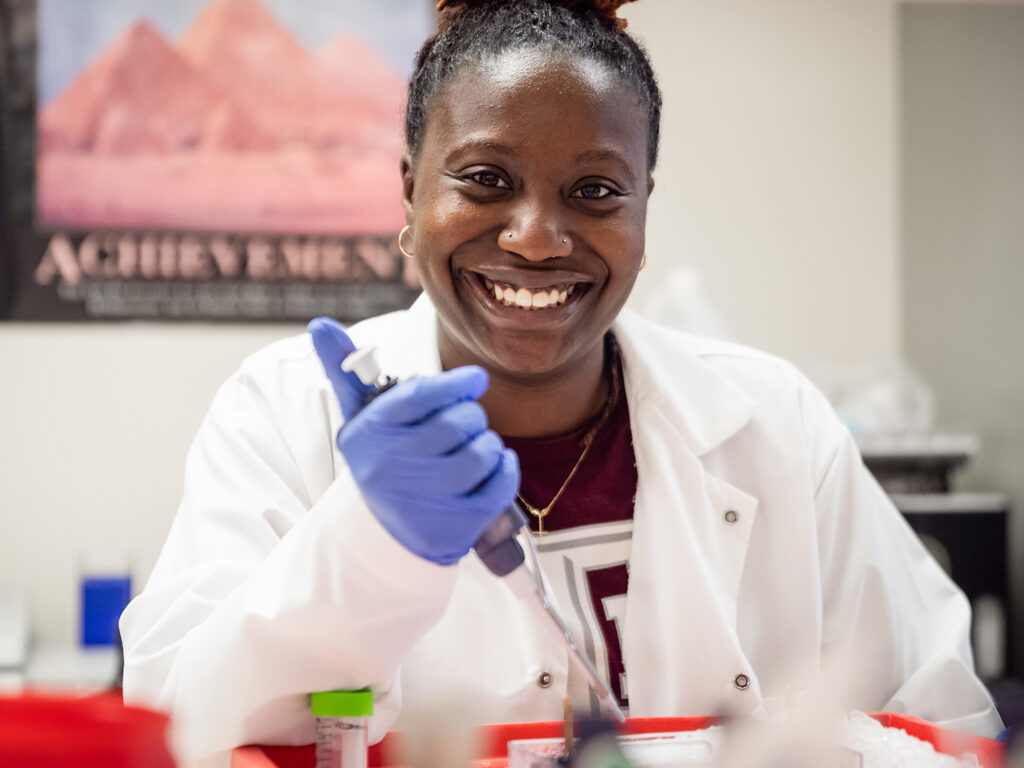Texas A&M Graduate Student Receives Grant For Metastatic Breast Cancer Research

Photos by Alyssa Moore, School of Veterinary Medicine & Biomedical Sciences
Hannah Carter, a graduate student at the Texas A&M School of Veterinary Medicine & Biomedical Sciences (VMBS), has received an $80,000 research grant from the Susan G. Komen Foundation to study sirtuins, a type of protein known to reduce signs of aging that may also play a role in breast cancer metastasis — the point at which cancer spreads to additional parts of the body.
The two-year grant, called A Supplement to Promote Inclusion for Research Excellence (ASPIRE), aims to increase the diversity of the breast cancer research workforce by providing funding to trainees from communities historically minoritized and marginalized in research. As supplemental funding, the award is given to trainees who work with established breast cancer scientists.
“This critical investment underscores Komen’s commitment to supporting cutting-edge research and innovative science that will lead to new treatment options for breast cancer, including metastatic breast cancer and other aggressive forms of the disease, and advance personalized breast cancer care, all with the goal of helping people live longer, better lives,” said Dr. Ann Partridge, MD, MPH, chief scientific adviser for Komen.
As one of 32 recipients from 27 prestigious institutions around the world to be selected for an ASPIRE grant, Carter, whose research mentor is Dr. Weston Porter, a professor in the VMBS’ Department of Veterinary Physiology & Pharmacology, hopes that her project will uncover the role that sirtuins have in regulating mitochondria — and, therefore, cancer metastasis — opening doors to new forms of cancer treatment.
“Sirtuins are more commonly studied in the field of aging and neurology,” Carter said. “Finding a connection between sirtuins and metastatic breast cancer would be good news for patients because we might be able to use existing anti-aging drugs as cancer treatments.”
“Susan G. Komen’s work is not complete until we can save all lives from breast cancer, and the research we’re funding today is helping people with breast cancer to live longer with better outcomes,” said Paula Schneider, president and CEO of Komen and a breast cancer survivor. “Komen’s grants will give promising scientists who are in pivotal stages of their careers the support they need to become the next generation of breast cancer leaders and advance research to save more lives.”
Studying Protein Relationships
Carter researches a specific sirtuin known as sirtuin 3 — or SIRT3 — that may play a role in certain changes to mitochondria that are associated with metastasis.
“In healthy cells, SIRT3 helps regulate mitochondrial function, but in unhealthy cells, I hypothesize that it can actually contribute to proliferating cancer cells,” she explained. “Everyone knows that the mitochondria is the powerhouse of the cell, but it does so much more than that. It governs a system of checks and balances that keep cells functioning normally.”
Another protein studied by Porter’s lab, SIM2, is usually present to regulate SIRT3 and to keep it in check, but that doesn’t happen in metastatic cancer cells.
“Loss of SIM2 is an important marker of metastatic cancer,” Carter said. “When it’s no longer present, cells and tumors become more reliant on SIRT3. In some of my previous work, I found that inhibiting SIRT3 actually causes cancerous cells to die. If I can figure out what that interaction is, then we may be able to work toward targeting sirtuins to treat metastatic breast cancer.”
Putting Passion To Work

For Carter, studying the inner workings of cancer metastasis isn’t just a passing interest — it’s part of a lifelong commitment to improving breast cancer research and patient outcomes.
“I want to focus on oncology, specifically breast cancer,” Carter said. “That’s why I joined Dr. Porter’s lab in the first place. I’ve also participated in several breast cancer awareness marches, and right now I’m even partnering with a program that raises awareness in minority communities about breast cancer screening.
“One reason that I’m so passionate about raising awareness for breast cancer screenings is that there’s a lack of information and overall lack of treatment in minority populations, specifically with Black women. Even though Black women are statistically the least likely to get it, they have the highest death rate from breast cancer,” she said.
But raising awareness and advancing cancer research is even more personal for Carter.
“The week of my recruitment interview for Dr. Porter’s lab, my grandmother died of breast cancer,” she said. “And the year before that, my god-mom died of breast cancer, too, so that’s why I’m here.”
As part of the project funded by the new grant, Carter will also work alongside a patient advocate — a breast cancer survivor who speaks for patient interests — as another reminder that her work is never just about science for the sake of new knowledge.
“Understanding the mechanisms at the cellular level is important, but I’ve learned to think about translating everything I do to the clinical setting, to ask myself, ‘How is this helping women?’” she said. “At the end of the day, that’s the most important thing about this project, because if I can prove that anti-aging drugs can be used to treat breast cancer, that will help women in the clinic.”
###
For more information about the Texas A&M College of Veterinary Medicine & Biomedical Sciences, please visit our website at vetmed.tamu.edu or join us on Facebook, Instagram, and Twitter.
Contact Information: Jennifer Gauntt, Director of VMBS Communications, Texas A&M College of Veterinary Medicine & Biomedical Sciences, jgauntt@cvm.tamu.edu, 979-862-4216


